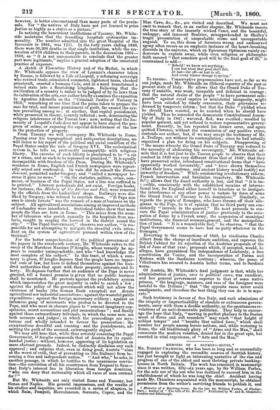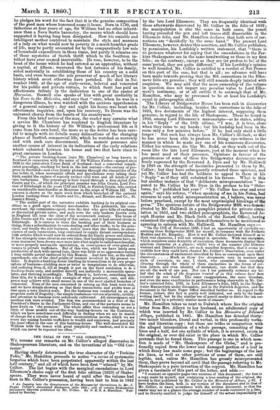ICEMOIRS OF A. BANKING-HOUSE.* Ma. ROBERT CHAMBERS, who has been
so long and so successfully engaged in exploring the recondite sources of Scottish history, has just brought to light an interesting narrative of the rise and progress of one of the oldest and most thriving private banking- houses in North Britain. The work has remained in manuscript since it was written, fifty-six years ago, by Sir William Forbes, for the sole use of the son who was destined to succeed him in the establishment of which he was long the chief. Accident having made Mr. Chambers acquainted with the manuscript, he obtained permission from the writer's surviving friends to publish it, and
• Memoirs of a Banking-house. By the late Sir William Forbes, of Pitsli,go, Bart.; Author of "The Late of Dr. Beattie." Publiahtd by W. and B. Chambers, London and Edinburgh,
he pledges his word for the fact that it is the genuine composition of the good man whose honoured name it bears. Born in 1739, and fatherless at four years of age, Sir William had no other inherit- ance than a Nova Scotia baronetcy, the means which should have supported it having long been dissipated. How his amiable and intelligent mother contrived to maintain the style and manners of a lady on what would now be poverty in a much humbler grade of life, may be partly accounted for by the comparatively low rate of household expenditure in those times, but partly it remains one of those mysteries of Scotch thrift which to the Southron in- tellect have ever seemed inscrutable. He rose, however, to be the head of the house which he had entered as an apprentice, without a capital, at fifteen ; recovered the lost fortunes of his family, aided materially in establishing those of his country on a solid basis, and even became the sole preserver of much of her literary history which must otherwise have perished. He died in No- vember 1806, at the age of sixty-seven, beloved and venerated for his public and private virtues, to which Scott has paid an affectionate tribute in the dedication to one of the cantos of Marmion. Boswell also speaks of him with great cordiality in his Tour to the Hebrides, and says that "once, when he was in a dangerous illness, he was watched with the anxious apprehension of a general calamity ; day and night his house was beset with affectionate inquiries, and, upon his recovery, Te Denm was the universal chorus from the hearts of his countrymen."
From this brief notice of the man, the reader may surmise what a service Mr. Chambers has rendered to English literature by giving to it the history of Sir William's professional life as it came from his own hand the more so as the writer has been care- ful to mingle with its details many delineations of the changing phases of Scottish commercial life, which he watched so narrowly and with such sure discernment. His memoir possesses also another source of interest in its indications of the early relations which subsisted between his house and two that have risen to great eminence in London.
The private banking-house [says Mr. Chambers] so long known in Scotland in connexion with the name of Sir William Forbes—merged since 1838 in the joint-stock Union Bank of Scotland—had a somewhat compli- cated genealogy, reaching far back in the last century—the century of pro- gress in Scotland—and even faintly gleaming through the obscurities of the one before it, when mercantile efforts and speculations were taking their birth amidst the embers of scarcely extinct civil wars and all kinds of_pri- vote barbarisms. The genealogy is here traced through a firm styled John Coutts and Co., of which the principal member was John Coutts, Lord Pro- vost of Edinburgh in the years 1742 and 1743, to Patrick Coutts, who carried on considerable merchandise at Montrose in the reign of William ILL The concern is shown as the main stock from which branched off the eminent London banking-firms of Coutta and Co., Strand, and Herries and Co., St. James's Street.- "The earlier part of the narrative exhibits banking in its original con- dition as a graft upon ordinary merchandise. The goldsmith, the corn- merchant, the commission-agent, were the first who gave bills of exchange or discounted private notes; and such were the only bankers known even in England till near the close of the seventeenth century. The house of John Coutts and Co. was entirely of this nature, and it had several rivals in Edinburgh. It is curious to trace the banking part of their business as rising, from a subordination to corn-dealing and other traffic, to be the prin- cipal, and finally the sole business, and.to learn that the banker, in conse- quence of early connexions, long continued to supply distant correspondents with articles which would now be ordered from the family grocer and oilman. It has strangely come about in our own time, that banking companies have, in some instances, been drawn once more into what might be called merchandise, or more properly mercantile speculation, in consequence of over-great ad- vances to private traffickers. But of this vice, which we have lately seen productive of such wide-spread ruin, there was little or no appearance during a long middle period embraced by this Memoir. And here lies, as the editor apprehends, one of the chief points of interest involved in the present vo- lume. It depicts a banking-house limiting its transactions to its own proper sphere of business—yielding once or twice to temptations to do otherwise, and suffering from it, till at length it put on the fixed resolution to be a banking-house only, and neither directly nor indirectly a mercantile specu- lator, and thriving accordingly. The Memoir is, however, something more than this, for it exhibits a fine example of what prudence, care, and dili- gence may achieve with small means in one of the most exalted branches of commerce. None of the men concerned in raising up this bank were rich, and we have details showing us that their transactions and profits were at first upon a very limited scale. But the business was conducted on an ap- propriate scale of frugality ; the simple tradesman-virtues of probity, civility, and attention to business were sedulously cultivated. All extravagance and needless risk were avoided. The firm was accommodated in a floor of the President's Stairs in the Parliament Close, and one of the partners seems to have dwelt on the premises.' The whole affair thus reminding us not a little of those modest out-of-the-way banking-houses on the Continent, which we have sometimes such difficulty in finding when we are in search of change for a circular note. These unostentatious merits, which we see every day raising humble traffickers to wealth and eminence had precisely the same effect in the case of this banking-house. The well-descended Sir William tells the lesson with great simplicity and candour, and it is one which can never be repeated too often."



























 Previous page
Previous page